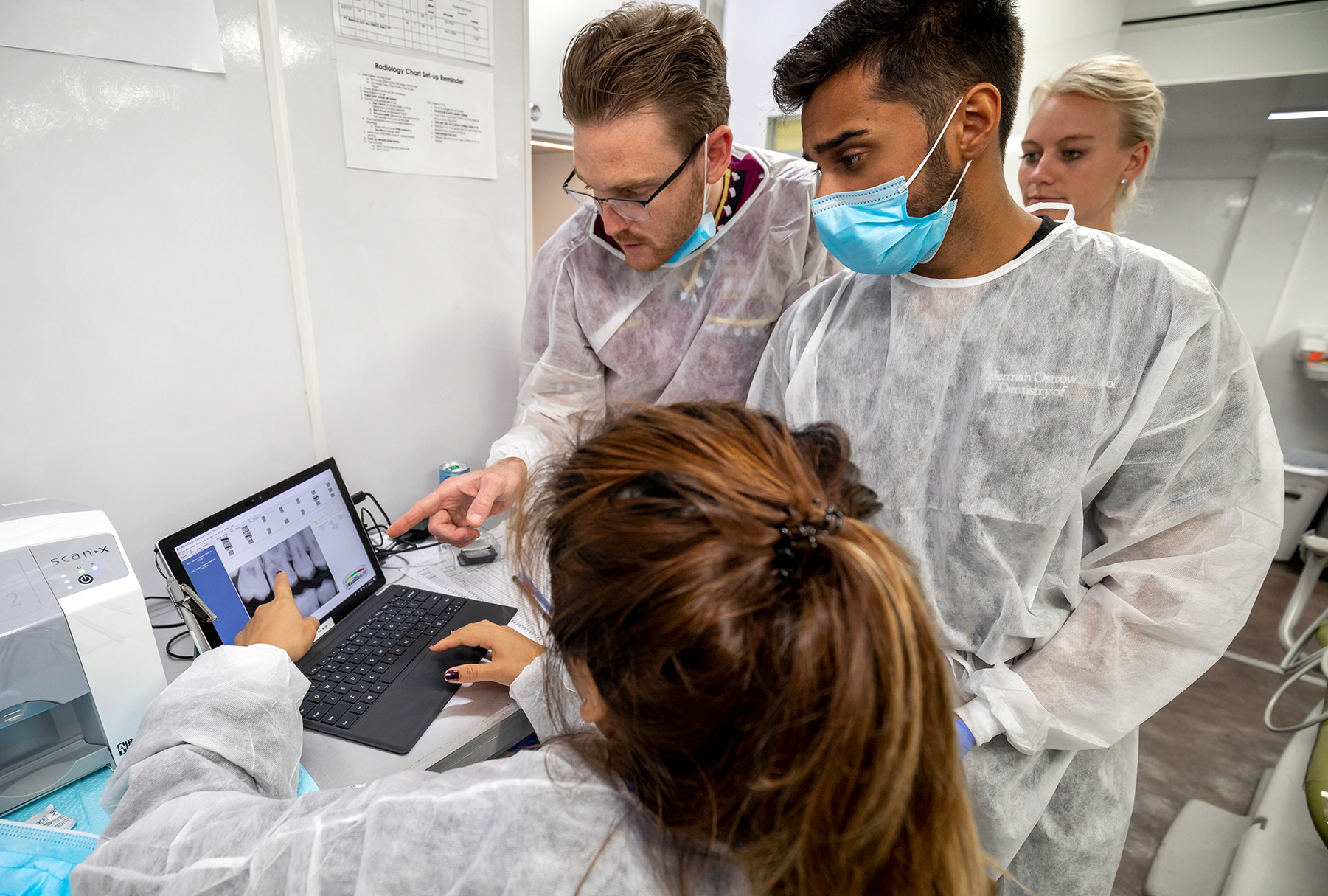
Learning Objectives for Academic Programs
Learning Pedagogy and Framework
- Identify contemporary craniofacial and developmental biology research questions
- Integrate biomedical knowledge and research methodologies to design and complete complex laboratory-based research projects
- Successfully prepare and defend laboratory research project at the PhD level using oral and written communication skills
- Obtain leadership roles in dental education and research as an academic or senior scientist in an academic institution or industry setting
Knowledge Base Fully proficient knowledge of:
- Normal and pathological craniofacial development
- Genetic disease
- Biomineralization of dental hard tissues
- Biosynthetic and biocompatible materials development
- Stem-cell biology and tissue engineering
- Dental pathologies affecting the dentition and surrounding tissues, including periodontitis, osteonecrosis, and pulpitis
Working knowledge of:
- Wide range of research methodologies
- Biochemistry
- Biostatistics
- Ethical issues in research
Learning Pedagogy and Framework
- Familiarity with contemporary research methodologies
- Critically analyze research papers
- Integrate biomedical knowledge and research methodology to complete a laboratory-based research project
- Successfully prepare and defend laboratory research project at the Master’s level using oral and written communication skills
- Obtain leadership or supportive roles in dental education and research or in the dental community
Knowledge Base
Working knowledge of:
- Normal and pathological craniofacial development
- Genetic disease
- Biomineralization of dental hard tissues
- Biosynthetic and biocompatible materials development
- Stem-cell biology and tissue engineering
- Dental pathologies affecting the dentition and surrounding tissues, including periodontitis, osteonecrosis, and pulpitis
Working knowledge of:
- Wide range of research methodologies
- Biochemistry
- Biostatistics
- Ethical issues in research
Learning Pedagogy and Framework
- Analyze complex geriatric cases with respect to physiologic, medical, dental management and social and behavioral issues through development of Case Portfolio.
- Demonstrate knowledge of contemporary research methods and resources through completion of Capstone Research Project
- Continuously assess knowledge and internalize feedback through weekly on-line conferences
KNOWLEDGE BASE
- Differentiate between normal physiologic aging and pathologic aging
Fully proficient knowledge of the dental and health needs of older patients, including:
- Oral tissue changes, common geriatric oral health problems and their treatments
- Signs, symptoms, diagnosis, monitoring and disease progression in geriatric patients
- Pharmacology, common medications used by older patients, and how to understand drug interactions in complex prescriptions
- Common oral lesions and orofacial pain conditions present in older adults
- Critical treatment modifications necessary for oral care of patients with systemic diseases
- Epidemiologic, sociologic, psychosocial, and other facts that impact oral health care
- Treating difficult and complex dental conditions in older patients
Fully proficient knowledge of the older dental patient with respect to:
- Neurogenic Orofacial Pain
- Soft-tissue Disease
- Bony Pathology
- Radiology and Advanced Imaging
- Systems Physiology
- Motor Disorders
- Sleep Apnea
Learning Pedagogy and Framework
- Analyze chronic orofacial pain, mucosal and osseous diseases seen in the oral and maxillofacial region with respect to physiologic, medical, dental management and social and behavioral issues through development of Case Portfolio.
- Demonstrate knowledge of contemporary research methods and resources through completion of Capstone Research Project
- Continuously assess knowledge and internalize feedback through weekly on-line conferences
Knowledge Base
Fully proficient knowledge of the dental needs of patients with orofacial pain conditions, including:
- Chronic facial pain (neurogenous pain and headache)
- Snoring and Obstructive Sleep Apnea
- Temporomandibular Derangements and Arthritis
- Headaches
- Various Oral Soft and Hard Tissue Diseases of Jaws and Mouth
- Salivary Gland Disorders
- Oral Cancer and Precancerous Lesions
- Masticatory musculoskeletal pain
- Neurogenic orofacial pain
- Sleep disorders related to orofacial pain
- Temporomandibular disorders
- Orofacial motor disorders including orofacial dystonias and bruxism
- lntraoral, intracranial, extracranial and systemic disorders
Fully proficient knowledge of the dental needs of patients with oral medicine conditions such as:
- Oral mucosal diseases and infections
- Burning mouth
- lmmunopathologic diseases
- Neoplastic diseases
- Osseous diseases including bisphosphonate osteonecrosis
- Salivary gland disorders and dysfunction
- Pharmacologic-related and systemic disorders that cause oral disease
Learning Pedagogy and Framework
Demonstrate integrated knowledge of basic, preclinical and clinical dental sciences including:
- Problem-solving skills
- Technical skills utilizing appropriate tools
- Independently accessing appropriate data and learning resources
- Working effectively in group situations
- Lifelong, self-motivated learning
- Managing medical presentations of dental patients
- Delivering skilled dental care
- Effective communication skills and
- Responding effectively to innovation and advances in dental science.
Knowledge Base
General Professional Doctoral Competencies:
- Provide empathic care for all individuals, including those from diverse, disadvantaged, and “at risk” populations in a variety of practice settings.
- Apply ethical, legal and regulatory policies and principles to the provision and/or support of oral health care services.
- Apply principles of self-assessment, critical-thinking, and problem solving, and seek information to enhance professional competency.
- Develop skills to access, critically appraise, apply and communicate scientific literature as it relates to providing evidence-based patient care.
Practice Management Competencies:
- Understand the differences between various models of oral health care delivery and financing.
- Understand the principles, regulations, and procedures necessary to manage and lead a contemporary dental practice.
Patient Care Competencies in Comprehensive Assessment, Diagnosis, and Treatment Planning:
- Perform comprehensive diagnostic evaluations and risk assessments based upon the application of scientific evidence with consultations as appropriate.
- Assess patient goals, values and concerns to establish rapport, guide patient care, maintain oral health and monitor therapeutic outcomes.
- Formulate multidisciplinary, comprehensive, sequenced treatment plans based on diagnosis, prognosis, and patient expectations, including discussion of risks, benefits and viable alternative.

Reviewing patient X-rays at a USC Mobile Clinic event
DON BOOMER